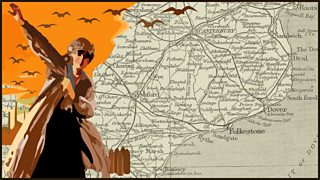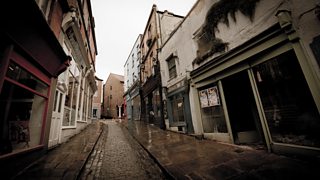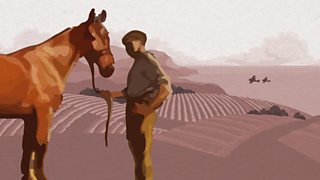Editor's Note:Â Katie Hims' recent radio work includes , , and which won the . Her stage play was produced by Clean Break at Soho Theatre in 2013.
Katie was the the lead writer for the first series of Radio 4's epic drama about the First World War, , which began on the 100th anniversary of the start of the war on 4th August 2014 and reflects events which happened exactly 100 years ago in each episode.  Producer, Lucy Collingwood, spoke to Katie about the challenges and rewards of writing Â鶹ԼÅÄ Front and acting as lead writer.

Drama serial charting life on the home front during the First World War.
How did you find writing an individual character’s story per episode?
I loved loved writing this way because each twelve minute episode became it’s own tiny play. There wasn’t the pressure to tell everyone else’s story within this brief time scale. And the rules were so clear. No action could take place without the presence of the central character – for a simple brain like mine it made it much easier! It also felt as if you could go deeper into a character in this way. It allowed for a level of emotional detail that was really satisfying to explore/ write.
Were some characters easier to write than others? Do you have a favourite character?
I loved writing with his constant newspaper and the way in which his addiction to the news and world events often meant he was oblivious to the emotional temperature around him or anything else that didn’t coincide with his own concerns. I also enjoyed writing with her blunt manner, her no frills attitude to life because life was hard and she wasn’t going to lie about it.

Sam and Jimmy
You write lots of brilliant characters who are children… what appeals to you about writing for child characters?
I like the way that children see the world, the way they interpret events or come to their own conclusions. They can be so left field or wild or imaginative or literal or lacking in politeness, and they offer an opportunity to tell a story that feels more anarchic, less in control. I really do love the way the children speak and the things they choose to comment on or ignore. Lines that children say in real life stay with me often.
How did you prepare to write Â鶹ԼÅÄ Front? What was your way in to writing about such a huge subject?
We were lucky enough to have fantastic resources made available to us. When we first started thinking about Â鶹ԼÅÄ Front we spent walking around the area, working in the library, meeting local historians. The Â鶹ԼÅÄ also had it’s own ongoing research team so someone else has always been a step ahead of us in gathering information. When it came to specific details that we were interested in obviously we could do our own background research but there was always someone one else on hand to help or help us find what we needed.

Folkestone
How do you come up with stories? What kind of stories most appeal to you?
I’m a big fan of a story that seems really dark and the sun unexpectedly comes out at the last moment. (Although of course you can’t play that trick every time . . .) A good short story can do that very well and these twelve minute episodes have a lot in common with the short story. They are about small and large moments. Or moments that appear small and later turn out to be significant. Moments which some truth becomes revealed.
And what has jumped out most story-wise from the research you’ve done/local newspapers? Did you find some bits of information sparked more stories than others?
The language of the newspapers is very striking. Adverts for remedies for obscure and unnamed ailments which sound completely unconvincing and quite useless. The pressure to enlist with girlfriends being asked’ is your best boy in khaki?’. The best local news articles told half a story and left you as a writer to fill in the gaps. The postman who drops dead in the first week of the first season is lifted straight from the newspaper. The male beauty competition is another.

Â鶹ԼÅÄ Front
How did you find working with historical info/facts?
Sometimes the facts were perfect and inspiring and sometimes we found ourselves really wishing that a storm had happened on a different day. Or a ship had sunk earlier or later. Historical dates did not always serve our story purposes but obviously we couldn’t ignore them, we needed to bend to them rather than cheat. Like any other constraint in a creative process the changes we regularly needed to make only improved and developed the story.
Have you ever written anything like this before?
I’d never written as a part of a team before. I’d never sat in a room with a group of writers and devised stories or invented long running characters.
How does writing as a team and writing as lead writer compare with working on your own projects?
In some ways there’s more responsibility involved in being part of a team. You don’t want to let anyone else down. Being lead writer worried me! Of course it gave me the opportunity to shape the overall narrative and that’s satisfying but only if you have a clear idea of where it all needs to go which of course at times we didn’t because it’s such a huge project. But we did an awful lot of the work as a team – and our editor is so brilliant at seeing what is missing from a story in order for it to work. The final pulling together of the story document was my job and I loved it but now I ‘m very happy to take a break and to be passing that role over to the highly organised and meticulous Shaun McKenna!
Â鶹ԼÅÄ Front is on Radio 4 every weekday at 12pm
and
Katie Hims is one of the judges for this year's Writer's Prize for Radio Drama. Â
